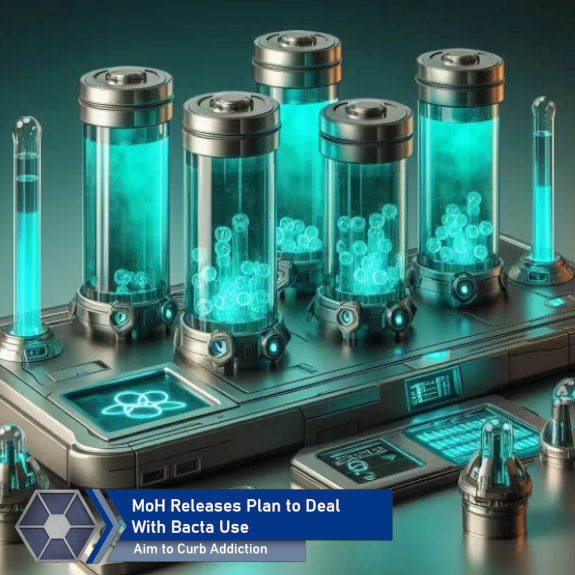Year 26 Day 74

The Ministry of Health (MoH) today released details on the upcoming change to the much maligned Government Sponsored Healthcare, also known as Troika Healthcare. Troika’s primary mandate was to offer medicine to all citizens of the Confederacy free of cost, but things have not gone according to plan. Since the introduction of the initiative, the program seemed to struggle to get off the ground; fighting through bouts of bad press, shortages and insolvency. Something had to change, and the Triumvirate Council and Ministry of Health held a joint meeting last week to address not only rising costs, but also how to curb alleged abuse in the system. After the meeting, the following press release was posted on the Holonet:
With increasing reports of abuse and concerns about addiction, the MoH has been working to take steps to promote patient education on the risks of bacta use and to curb potentially inappropriate access. The MoH has developed a Tier System for what is designated as a controlled substance, with Tiers III and IV having low risk for abuse, Tier II having a higher risk for abuse and Tier I considered as drugs with no currently accepted medical use and a high potential for abuse. Immediately with this program announcement, many bacta products will be designated as controlled substances. Koho and Bacta patches will be designated as a Tier IV, while Bacta based Healing Sticks will be designated as a Tier III Controlled Substance. Bacta refills will be designated as a Tier II controlled substance, with all Ryll products designated as a Tier I Controlled Substance. Stimpak and antidotes are not being designated as controlled substances at this time.
For our citizens, in order to obtain a controlled substance, a patient would need to see a licensed physician who can prescribe these medications. The medication’s will be limited to 30 day scripts, and the dispense quantity may be limited based on the tier the medication is dedicated as.
We will not require our licensed physician to have any additional license to dispense at this time. Citizens will need to fill their prescription at a designated pharmacy. While the patient should not have a copay to pick up their prescription, the pharmacy may charge a small administrative fee.
In addition, in an effort to try to curb unauthorized access, prescription refills will be saved in a new database called the Hassarian Official Automated Rx Reporting System (HOARRS).
HOARRS is a tool to track the dispensing and personal furnishing of controlled prescription drugs to patients. OARRS is designed to monitor this information for suspected abuse or diversion (i.e., channeling drugs into illegal use), and can give a prescriber or pharmacist critical information regarding a patient’s controlled substance prescription history. This information can help prescribers and pharmacists identify high-risk patients who would benefit from early interventions.
Prescribers will have to check the HOARRS database at least every 90 days, monitoring their patients’ fill history and making sure that they are not getting prescriptions from multiple providers.
Many of us from inside the MoH think this will help deter “pill farms” and help decrease addiction. Some have raised concerns about limiting access to patients in need of life sustaining drugs, but patients who are using their medications as prescribed have nothing to worry about. Providers have voiced concerns about increased administrative burden, and we want to assure them that the increased burden is an unfortunate barrier but worth it to promote patient safety.

In addition, we also want to respect the medical decision making process of our medical providers. Prescriptions that fall inside the designated dispense maximum per month will be fully covered under the Troika Healthcare But, if a patient requires more than this designated amount, they will have a designated copay for any additional amounts as approved by their medical professional. Tier IV substances are limited to 600 per month, Tier III substances are limited to 400 per month, and Tier II substances are limited to 300 per month.
An important note is that none of these restrictions apply to the Ministry of Defense. Military personally will have unlimited access to all medical products as determined by their superior officer and mission parameters
The Board also created a one-page sheet designed to assist pharmacists in talking with a patient in situations where they may need to refuse to fill a prescription. Entitled “Sometimes We Just Have to Say No”, the fact sheet provides an overview of when prescriptions are not considered valid, explains a pharmacist’s corresponding responsibility under the law and provides a phone number where patients and families can locate an addiction treatment provider.

While the initial pilot program will be released in Hassaria this month. Plans are being negotiated with representatives from Tar Morden and Thesme, but the administration expects the project to be fully operational by the end of next month.
